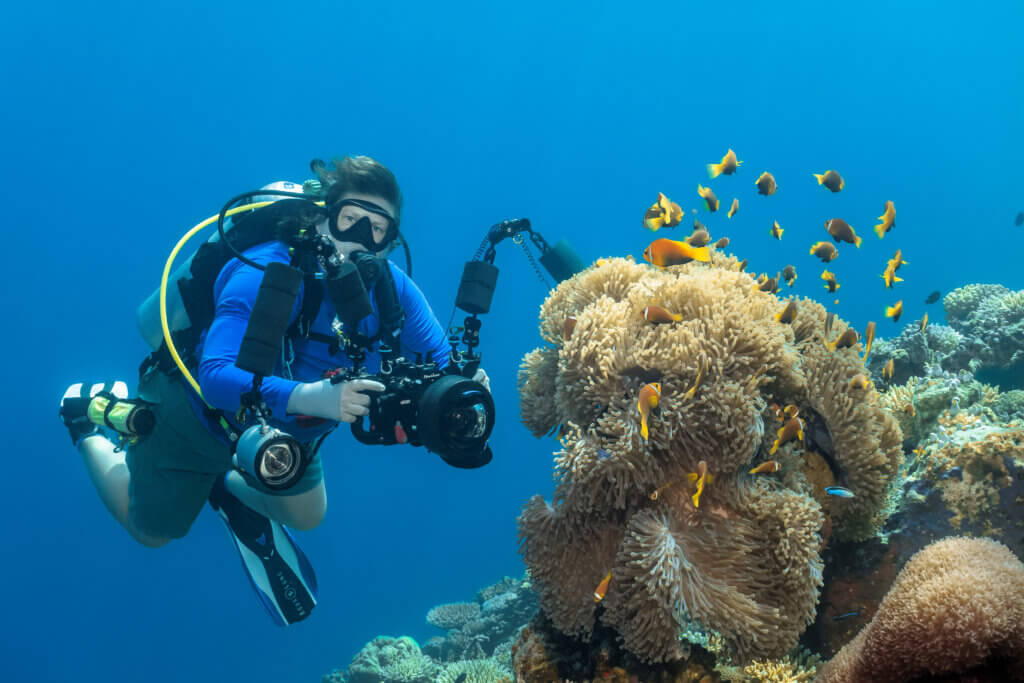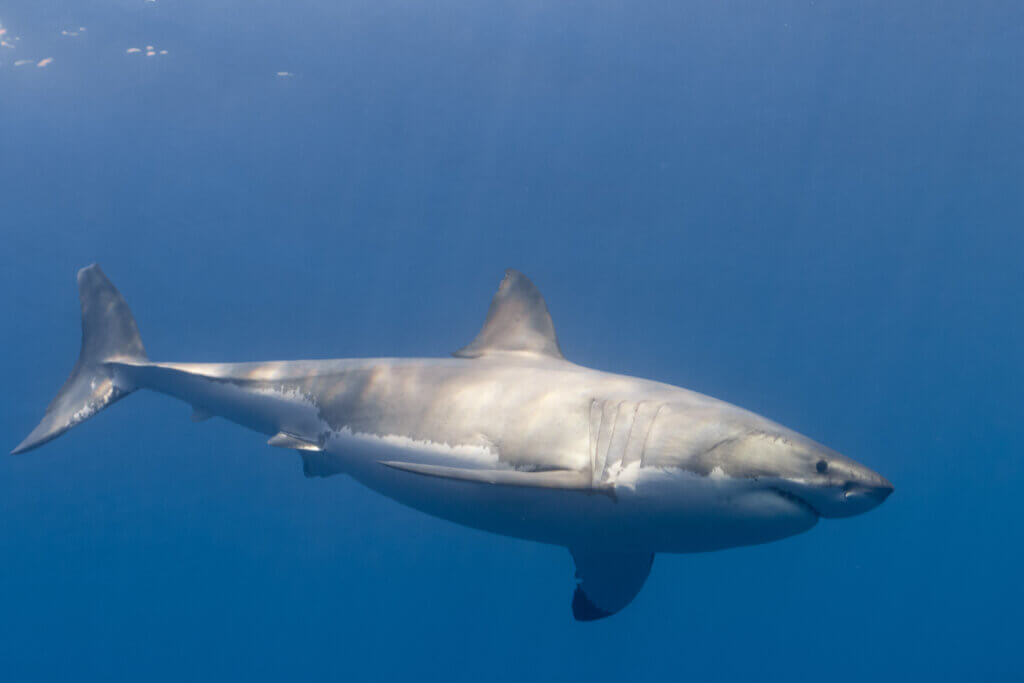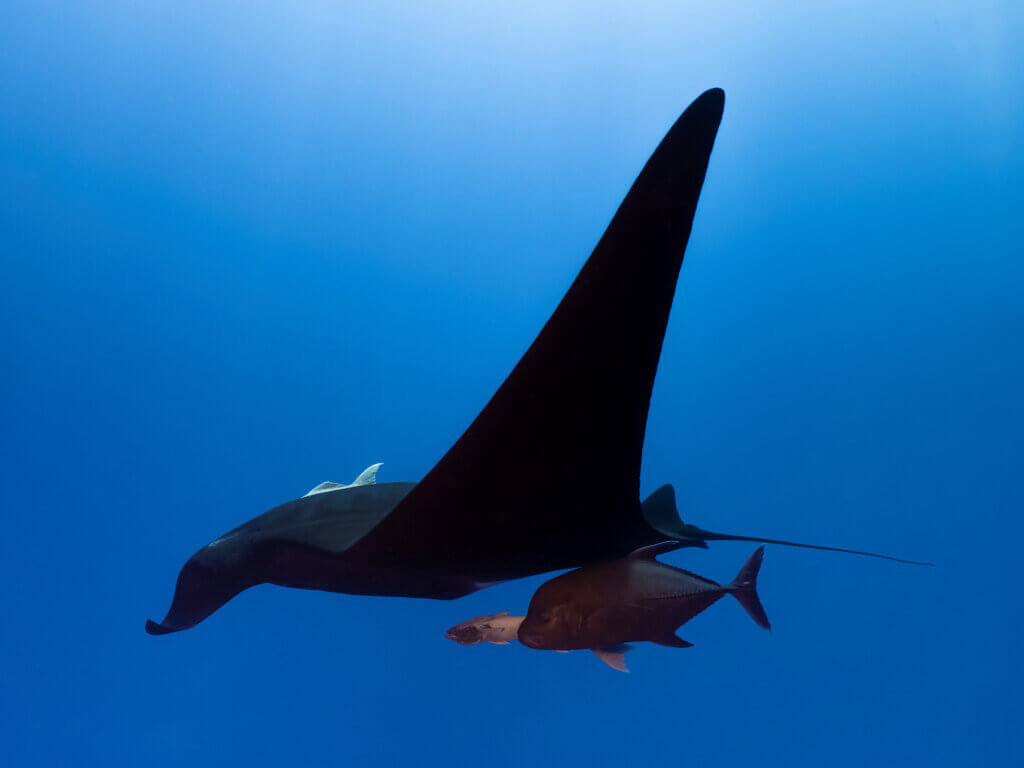As a veteran scuba diver who has donned her wetsuit around the globe, Stephanie Lafontaine is never more at peace than when deep below the water’s surface. Even if she’s sharing the depths with sharks, she considers it her happy place.
So when Lafontaine, 42, learned in April 2019 that she had inflammatory breast cancer (IBC), and doctors initially offered only to keep her comfortable for the time she had left, she immediately sought another opinion. She found a cancer center with one of the few dedicated IBC programs in the country, just a few miles from her Everett, Mass. home, and there she received more promising news: there was a treatment plan she could start right away that could help her return to a full life of work, travel, and underwater bliss.
Lafontaine has since made more than 200 dives, each of them a new affirmation of freedom and survivorship. She has also resumed her other passion of underwater photography, and with the help of her team in the Inflammatory Breast Cancer Program at Dana-Farber Brigham Cancer Center, she is thriving in remission more than three years after completing her active treatment. Lafontaine knows that while inflammatory breast cancer accounts for less than five percent of all breast cancers, her care team sees it all the time.
“Connecting to a team at Dana-Farber Brigham focused mainly on IBC gave me so much confidence,” says Lafontaine. “I knew my treatment was going to benefit directly from research they were doing at Dana-Farber, and that they would always be up on the newest advances and clinical trials.”


Rash decision
A Boston-area native, Lafontaine was drawn to the water — whether at the beach or the pool — as soon as she could walk. She was in college and traveling with her family when she first tried scuba diving, and was hooked immediately to the beauty and calmness of underwater exploration. She earned her advanced diving certification, and a few years later, with savings from her career as a mechanical engineer, traveled to the first of what would become more than 15 different countries on diving trips.
Deeply ensconced in her life of adventure, Lafontaine was not too concerned when she developed a rash on her right breast in early 2019. At 37, and with no family history of breast cancer, she thought she was too young to worry about the disease. Plus it was rash, not a lump — the traditional warning sign for breast cancer. What she didn’t know is that in IBC, cancer cells block the lymph vessels of the skin of the breast, causing the breast to appear red or inflamed. A lump is usually not a symptom, and the disease mostly impacts younger women.
Eventually, when the rash didn’t go away, Lafontaine visited her primary care physician on April 1, 2019. This led to an appointment the next day with a breast specialist at a major hospital, who conducted a mammogram and biopsy. These tests were inconclusive, and the specialist told Lafontaine they’d be back in touch about scheduling an MRI.
Less than a half-hour after she returned home, Lafontaine’s phone rang. She was told to come right back to the hospital, where a nurse practitioner took her vitals and then said a doctor would be in shortly to discuss inflammatory breast cancer. That’s the first Lafontaine heard of the diagnosis she would officially receive a week later.
“They were preparing to treat me as if they knew that the cancer had spread to my bones, and told me that they would do what they could to keep me comfortable,” recalls Lafontaine. “This was before I even had a bone scan or PET/CT scan.”
Uncomfortable with this approach to her care, Lafontaine did some research and learned about the IBC Program at Dana-Farber Brigham. The only program of its kind in the Northeast, it has breast cancer surgeons, medical oncologists, radiation oncologists, radiologists, pathologists, and basic science researchers with specific expertise in identifying and treating IBC. Each patient receives prompt, personalized care for their specific cancer, along with access to the latest clinical trials, integrative therapies, and a monthly educational support group.
Upon meeting with program founder and now-retired director Beth Overmoyer, MD, FACP, who would become her oncologist, Lafontaine felt a surge of confidence and comfort. By this point, scans had confirmed that her initial diagnosis was wrong; the cancer had not spread to her bones.
“Dr. Overmoyer drew me pictures of how IBC formed, what it did, and why it was different from other breast cancers,” recalls Lafontaine. “It was a great two-way conversation. She said she wanted to take another biopsy, and, depending on what it revealed, she had different plans in place that would treat me not just to keep me comfortable, but to have a full life.”
At the end of that initial consultation, during which Lafontaine also met her surgeon and other members of her new treatment team, Overmoyer asked if she had any more questions. There was just one: Will I be able to scuba dive again?
“Absolutely,” Overmoyer replied.

Taking the plunge
Starting in May 2019, Lafontaine began a 19-month treatment plan hatched that first day with Overmoyer. She underwent two different chemotherapy protocols to shrink her tumor, a complete right breast mastectomy with axillary lymph node dissection, and then 30 daily radiation treatments and more chemotherapy. Overmoyer worked closely with Lafontaine’s surgical and radiation teams, all also part of the IBC program, and Lafontaine was able to work through most of her treatment. Acupuncture and massage sessions in Dana-Farber’s Leonard P. Zakim Center for Integrative Therapies and Healthy Living helped with side effects.
Many IBC patients choose to undergo delayed breast reconstruction, but Lafontaine did not want to deal with the months of recovery involved. She had spent enough time away from her wetsuit already, and in July 2020 — while still in active treatment — she returned to her happy place on a trip to Turks and Caicos. Friends in the diving community made sure Lafontaine stayed safe, and helped her with her heavy tank, weight belt, and other gear.

More than 200 dives later, including recent trips to Cuba and the Maldives, Lafontaine is still going strong. She comes to Dana-Farber Brigham for regular check-ups with oncologist Filipa Lynce, MD, who succeeded Overmoyer as director of the IBC Program upon Overmoyer’s 2021 retirement. Lafontaine says the transition to a new doctor was seamless, and although she has remained in remission, she chose to undergo a mastectomy of her left breast in October 2023 as a preventive measure after testing positive for the PALB2 gene mutation. Individuals with this inherited mutation are at increased risk of developing breast cancer by age 70, even if they are already breast cancer survivors.
Lafontaine has also become a staunch advocate for other IBC patients, helping connect them to Dana-Farber Brigham’s program and its offerings. She is especially drawn to helping new patients; remembering her days as a novice diver, she knows the importance of having seasoned veterans to look to for guidance and encouragement. She has even fundraised for the IBC program by creating and selling calendars featuring her underwater photography.
“If I had stuck with the team that wanted to just make me comfortable, I wouldn’t be here now,” Lafontaine says. “This community saved me.”
